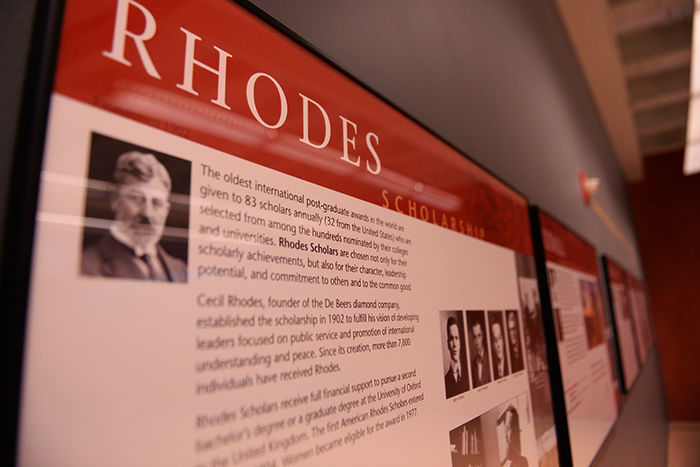Cecil Rhodes scholarship honors a racist
A plaque describing the Rhodes scholarship hangs on the ground floor of the CUB near the library entrance.
February 21, 2017
We have a long-standing history in America of celebrating people, symbols and artifacts that are representative of major injustices that have occurred in our country.
All the way from Columbus Day to slave owners on our currency to the portrait of Cecil Rhodes that hangs on the ground floor of the CUB across from the Union market.
The Rhodes Trust is a British charity established in honor of Cecil J. Rhodes’ will. It provides full financial support for Rhodes Scholars to pursue a degree at the University of Oxford in the United Kingdom. As of now, he is hailed for being the founder of the British South Africa Company that acquired African lands for British territories and profit, according to South African History online.
When I first heard the name Cecil Rhodes, I was taking Women’s Studies 120 and learning about race and reproduction in a global context.
“By the late nineteenth century,” professor Jenifer Barclay said, “many justified the appropriation of African lands, exploitation of African labor and creation of colonial governments by framing this as a ‘civilizing mission’ that would ultimately better supposedly downtrodden, ‘backward African peoples.’ ”
Cecil Rhodes was a big believer in colonization and imperialism, and he was an active proponent of the two in the 19th century, Barclay said.
In fact, in a letter Rhodes wrote at Oxford in 1877, he said, “just fancy those parts that are at present inhabited by the most despicable specimen of human being, what an alteration there would be in them if they were brought under Anglo-Saxon influence … if there be a God, I think that what he would like me to do is paint as much of the map of Africa British Red as possible.”
As if it wasn’t enough to simply view Africans as “the most despicable specimen of human being,” Rhodes was also successful in colonizing much of Southern Africa. What is now known as Zambia and Zimbabwe was once known as Northern and Southern “Rhodesia,” named after Rhodes who held positions in those lands and had influence over the lives of its indigenous people.
In March of 2015, students in South Africa demonstrated against the statue of Cecil Rhodes that sits on the campus of the University of Cape Town. And rightfully so.
I would imagine that statue served as a symbol of oppression and disdain to them as well as a reminder of the terrible legacy of colonialism that many Africans countries are forced to deal with today.
Rhodes was also an advocate for the ruling of indigenous people in the Cape Colony of South Africa.
“I contend that we (Europeans) are the first race in the world,” Rhodes wrote in the same letter, “and that the more of the world we inhabit the better it is for the human race.”
It’s absolutely absurd to memorialize such a dishonorable man, a man who had such a low regard for the lives of people who looked different from him.
The question that “social justice warriors” like myself and others ask is, where do we start to patch up the wounds of racial injustice here in the United States and globally? Well, addressing our past, understanding it and making amends with it is a good start.
In South Africa, for example, Nelson Mandela established a Truth and Reconciliation Commission to address issues and material consequences of racial inequality and disparities left over from apartheid. This is a positive step in the direction of dealing with difficult social legacies.
What doesn’t help to heal the wounds of global injustice is the continued glorification of historical figures who have contributed to the same global inequities that we fight today.
Basheera Agyeman is a junior comparative ethnic studies major from Accra, Ghana. She can be contacted at 335-2290 or by opinion@dailyevergreen.com. The opinions expressed in this column are not necessarily those of the staff of The Daily Evergreen or those of The Office of Student Media.









